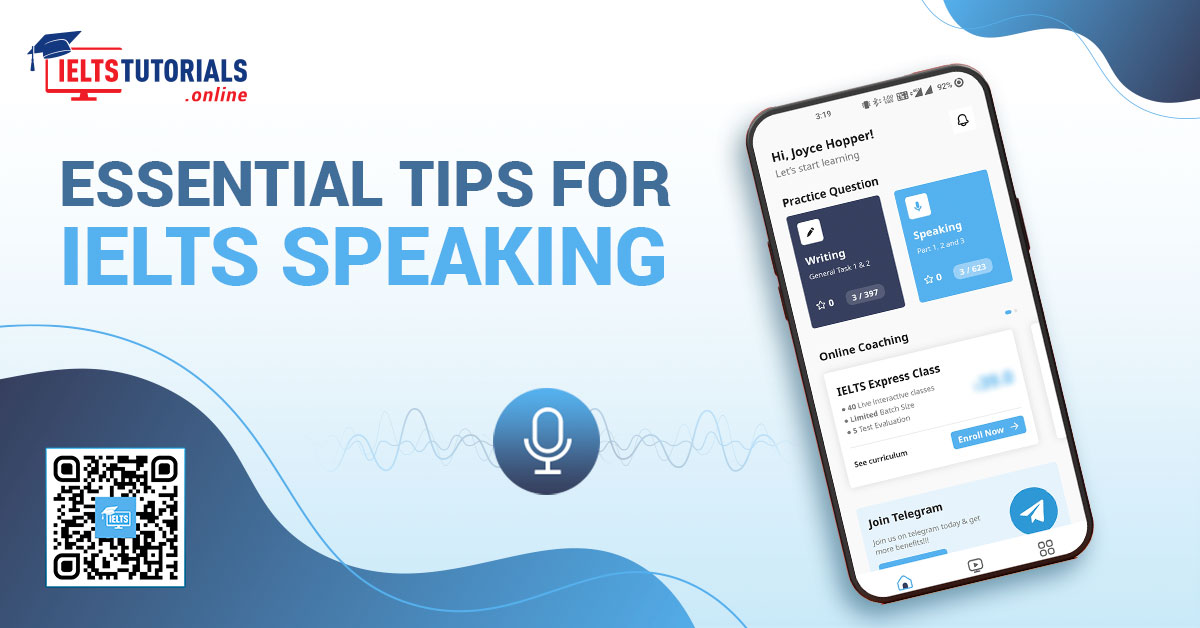
Practice IELTS Speaking Part 1 with Introduction Questions and Tips
You must want to know what actually happens in the IELTS Speaking Exam Part 1. There are a hundred questions in your mind right now regarding your introduction part of the IELTS Speaking Test.
How should I introduce myself?
Should I speak formally way or Informally way?
Can I give fancy and long answers, or should I keep it short and simple?
Surely, these questions make you feel nervous sometimes, but there is nothing to worry about. It is not as complicated as it seems.
Know how to introduce yourself in the IELTS Speaking Test and with that also go through the IELTS Speaking Tips and strategies to increase your IELTS Speaking score.
- What happens in the IELTS Speaking Exam?
- How to give my name?
- How many sections are there in the IELTS Speaking part 1?
- How to describe my hometown?
- How to describe my home?
- How to describe my current work?
- How to describe my studies and degrees?
Let's find out some simple ways to ace in the IELTS Speaking part 1.
What happens in the IELTS Speaking Exam?
When you arrive at the exam centre, you are supposed to leave your belongings in a particular room and go to the waiting area.
Your name will be announced, and you will be invited into the room where your test will be recorded. So don't get a surprise while seeing a recorder near you.
How to give my name?
The examiner will see your identity card to check your name. He will ask you for your name.
Examiner: What is your name?
Candidate: Rakesh Sharma
Examiner: and what can I call you?
Candidate: Just call me Rakesh
How many sections are there in the IELTS Speaking part 1?
- The examiner will ask you for an introduction.
- They may also ask 1-2 questions on the following; Hometown, Home, Study, Work.
- You will be asked 2-3 questions on part 1 topics of this test.
How to describe my hometown?
The examiner will be interested to know more about you by asking your birthplace or where you live now.
It doesn't matter whether you say Delhi, Bombay or any other city, the essential part is that you are well aware of that city and that city is close to you.
Examiner: Where do you live?
Candidate: I live in Ahmedabad. I have been living in Ahmedabad for three years. It is a heart of Gujarat.
Examiner: Are most of the Gujarati businessmen?
Candidate: Majority of them are in some business, but that's not the only truth because nowadays people of Gujarat have diversified them into many professional categories.
How to describe my home?
While describing your home, you will need to keep basic vocabularies in your mind related to homes and residential flats. The examiner will look for a wide range of vocabularies in your sentences.
Remember collocations for your speaking test. For describing your home, you can use the following words:
A cosy home
A high-rise building
A spacious flat
A well-equipped gym
A huge playground
Well connected roads
Examiner: What kind of accommodation you prefer to stay in Ahmedabad?
Candidate: I prefer to stay in a cosy bungalow so that I can spend some time in peace. It is not too big, but it is beautiful and well-connected with the roads.
Examiner: Do you live alone or your family stay with you?
Candidate: I live with my parents.
How to describe my current work?
The examiner will ask you more about your work and experience. Give them a response in a very polite way and a simple way.
Examiner: Are you a student or do you work somewhere?
Candidate: I am working in Aussizz Group, and I am a Software Developer.
Examiner: Can you describe your office culture?
Candidate: The office has a four-storey building, and I work on the 4th floor with more than 50 employees. The facilities offered by Aussizz Group is excellent, and we enjoy working there. The atmosphere is quite relaxed, and we have total freedom to share our knowledge.
How to describe my studies and degrees?
Many times, the examiner asks the candidate about their studies. Be prepared to get such type of questions in the IELTS Speaking Exam.
Examiner: Why did you to choose to become a software developer?
Candidate: To be honest, I always wanted to do engineering because of my passion for coding. I was inspired by my father, who is also working in a technical company. So, ever since then, I wanted to be a software developer.
Implement all these tips in your preparation, and then you are ready for your IELTS Speaking introduction questions. The only way to ace the exam is practice.
Also, you could download the IELTS Tutorials Exam Practice App for your IELTS speaking preparation. Get an extensive collection of IELTS Speaking topics with model answers and continue to learn with the best study guide.
Tips and Tricks
- Arrive at the test centre early.
- Get mentally prepared about the test to stay confident.
- Don't look at the notes which the examiner makes because those are not your IELTS Speaking score.
- Keep your answers short so that you do not get fumble while speaking. 2-3 sentences are enough for the introduction section.
- Try to improve the quality of your sentences using several vocabularies. Enhance the quality and increase your chance of getting a high score in the speaking test.
- You can ask the examiner to repeat the question to buy some time to think about your answer. But don't use this trick in your every answer. Otherwise, you will lose your scores by infuriating the examiner.
- Don't make a list for your answers; otherwise, it will not look natural to the examiner. Give small details and show your vocabulary knowledge.